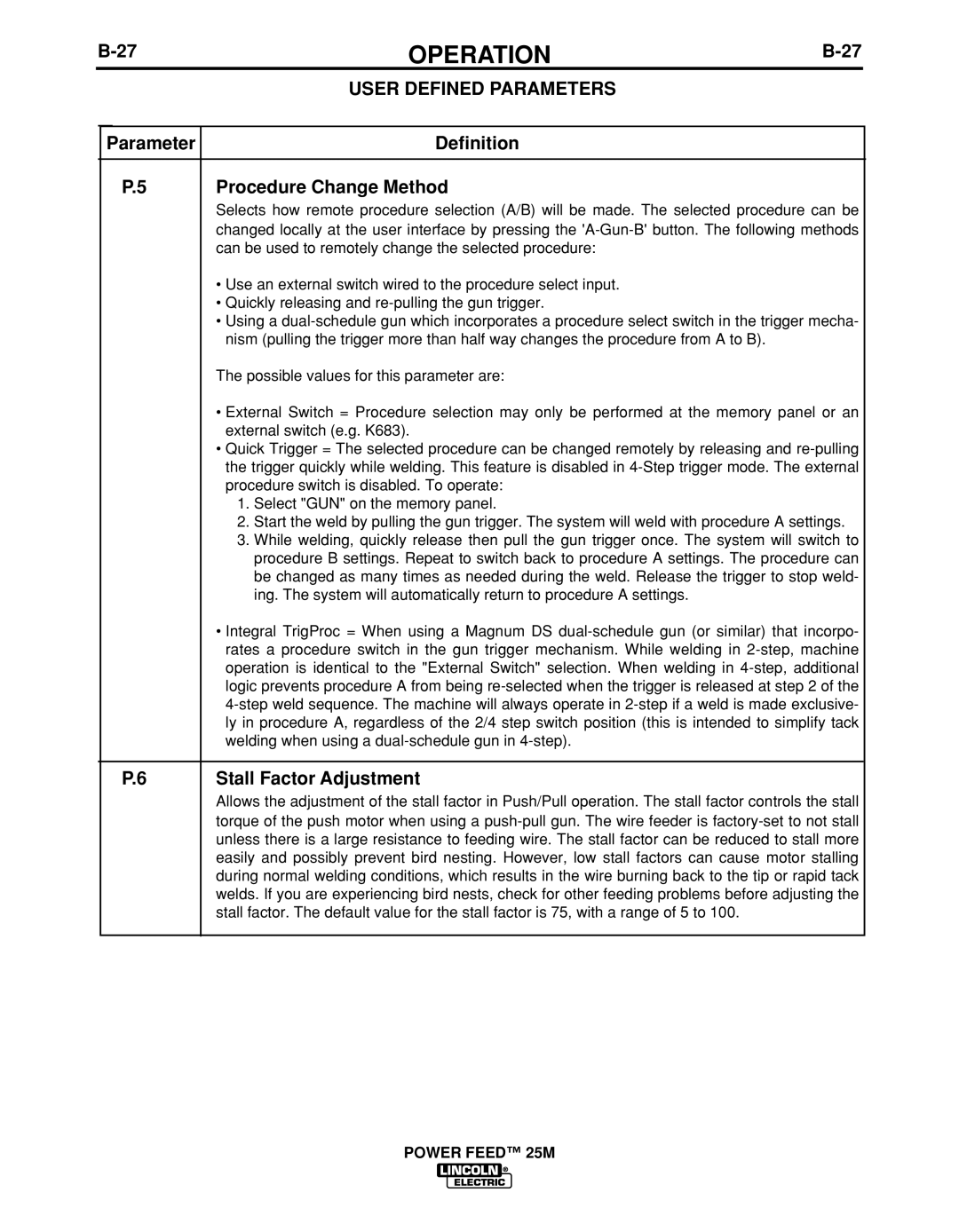| OPERATION | ||||||
|
|
|
|
|
|
|
|
|
|
|
|
| USER DEFINED PARAMETERS |
|
|
|
|
|
|
|
|
| |
|
|
|
|
|
|
| |
|
|
| Parameter | Definition |
|
| |
|
|
|
|
|
|
| |
|
|
| P.5 | Procedure Change Method |
|
| |
|
|
|
|
| Selects how remote procedure selection (A/B) will be made. The selected procedure can be |
| |
|
|
|
|
| changed locally at the user interface by pressing the |
| |
|
|
|
|
| can be used to remotely change the selected procedure: |
|
|
|
|
|
|
| • Use an external switch wired to the procedure select input. |
|
|
|
|
|
|
| • Quickly releasing and |
|
|
|
|
|
|
| • Using a |
| |
|
|
|
|
| nism (pulling the trigger more than half way changes the procedure from A to B). |
|
|
|
|
|
|
| The possible values for this parameter are: |
|
|
|
|
|
|
| • External Switch = Procedure selection may only be performed at the memory panel or an |
| |
|
|
|
|
| external switch (e.g. K683). |
|
|
|
|
|
|
| • Quick Trigger = The selected procedure can be changed remotely by releasing and |
| |
|
|
|
|
| the trigger quickly while welding. This feature is disabled in |
| |
|
|
|
|
| procedure switch is disabled. To operate: |
|
|
|
|
|
|
| 1. Select "GUN" on the memory panel. |
|
|
|
|
|
|
| 2. Start the weld by pulling the gun trigger. The system will weld with procedure A settings. |
| |
|
|
|
|
| 3. While welding, quickly release then pull the gun trigger once. The system will switch to |
| |
|
|
|
|
| procedure B settings. Repeat to switch back to procedure A settings. The procedure can |
| |
|
|
|
|
| be changed as many times as needed during the weld. Release the trigger to stop weld- |
| |
|
|
|
|
| ing. The system will automatically return to procedure A settings. |
|
|
|
|
|
|
| • Integral TrigProc = When using a Magnum DS |
| |
|
|
|
|
| rates a procedure switch in the gun trigger mechanism. While welding in |
| |
|
|
|
|
| operation is identical to the "External Switch" selection. When welding in |
| |
|
|
|
|
| logic prevents procedure A from being |
| |
|
|
|
|
|
| ||
|
|
|
|
| ly in procedure A, regardless of the 2/4 step switch position (this is intended to simplify tack |
| |
|
|
|
|
| welding when using a |
|
|
|
|
|
|
|
|
| |
|
|
| P.6 | Stall Factor Adjustment |
|
| |
|
|
|
|
| Allows the adjustment of the stall factor in Push/Pull operation. The stall factor controls the stall |
| |
|
|
|
|
| torque of the push motor when using a |
| |
|
|
|
|
| unless there is a large resistance to feeding wire. The stall factor can be reduced to stall more |
| |
|
|
|
|
| easily and possibly prevent bird nesting. However, low stall factors can cause motor stalling |
| |
|
|
|
|
| during normal welding conditions, which results in the wire burning back to the tip or rapid tack |
| |
|
|
|
|
| welds. If you are experiencing bird nests, check for other feeding problems before adjusting the |
| |
|
|
|
|
| stall factor. The default value for the stall factor is 75, with a range of 5 to 100. |
|
|
|
|
|
|
|
|
|
|
|
|
|
|
|
|
|
|
